The Construction Management prepares students for a professional role in the management of construction projects by providing students with an understanding of both the people-related and technical requirements necessary for the successful management of projects, as well as their organizational and strategic aspects. The course enables theoretical and conceptual exploration of construction project management issues whilst also stressing the essential practical aspects such as project control mechanisms, resource management, budgeting and cost management, stakeholder management, contract management, IT applications and information management.

Engagement with important and emerging construction industry issues is built into course Unit learning and assessment activities; the core Construction Project Management Professional Practice unit being delivered in partnership with industry partner organizations so that students are exposed to the challenging and exciting environment of contemporary civil engineering and construction projects.
Programme Aims
This course aims to provide you with the highly sought-after knowledge and skills needed to manage construction process, particularly collaborating with numerous stakeholders.
The Construction Management course will help you:
- Gain a broad foundation in technical knowledge and managerial skills for a rewarding career in construction management.
- Acquire knowledge in finance, contracts and other areas critical to delivering large-scale projects.
- Understand the major issues involved with collaborating and managing multiple stakeholders and applying academic knowledge to inform objective decision-making
- Learn how information technology can increase productivity and communicate results obtained through analysis, design and management of all resources
- Develop interpersonal skills, enhancing the ability to manage large and small teams and collaborate effectively with a wide range of stakeholders.
The Programme also aims to provide students with a foundation for further professional development and extension of their knowledge in preparation for further academic study at level 8.
Graduate Qualifications
- Graduate Certificate in Construction Management
- Graduate Diploma in Construction Management
Designation Qualifications
- Certified Construction Professional (CCP)
- Certified Construction Manager (CCM)
- Certified Construction Director (CCD)
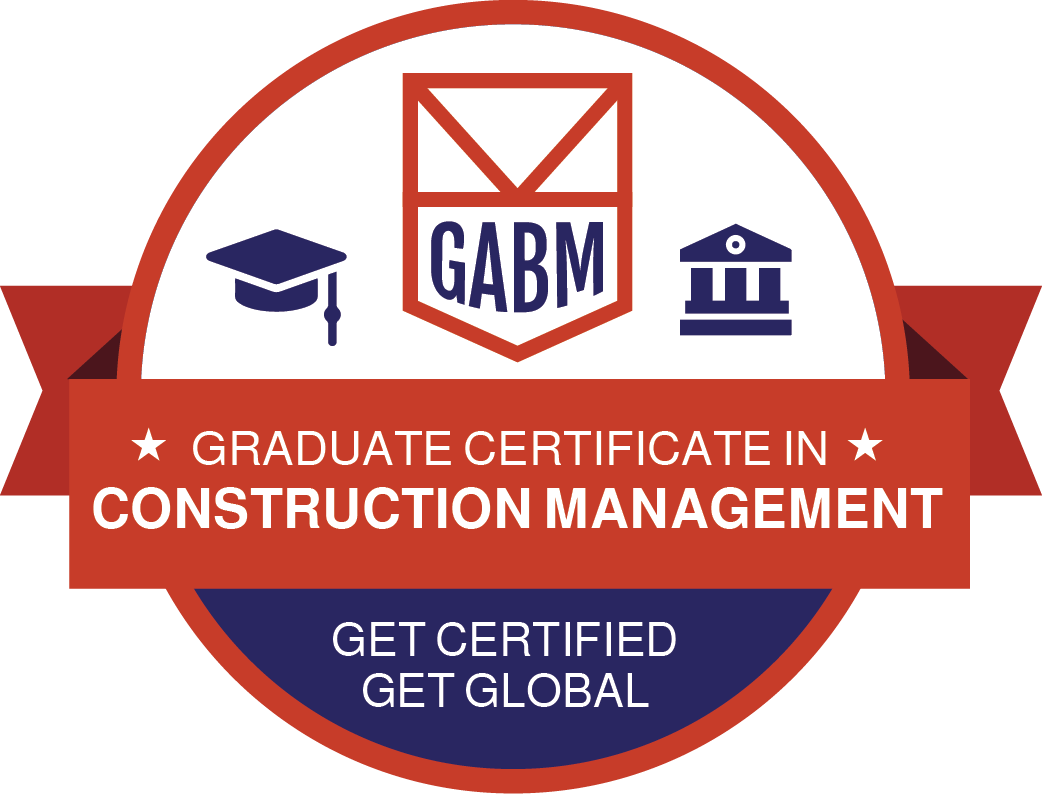
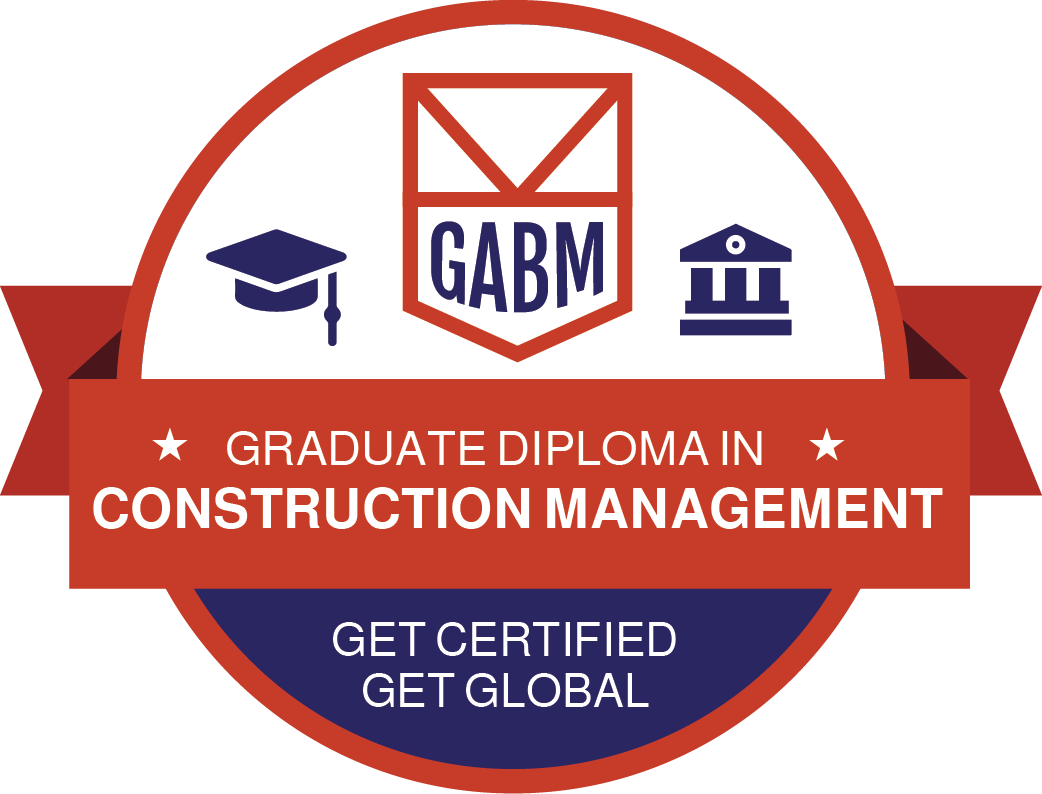
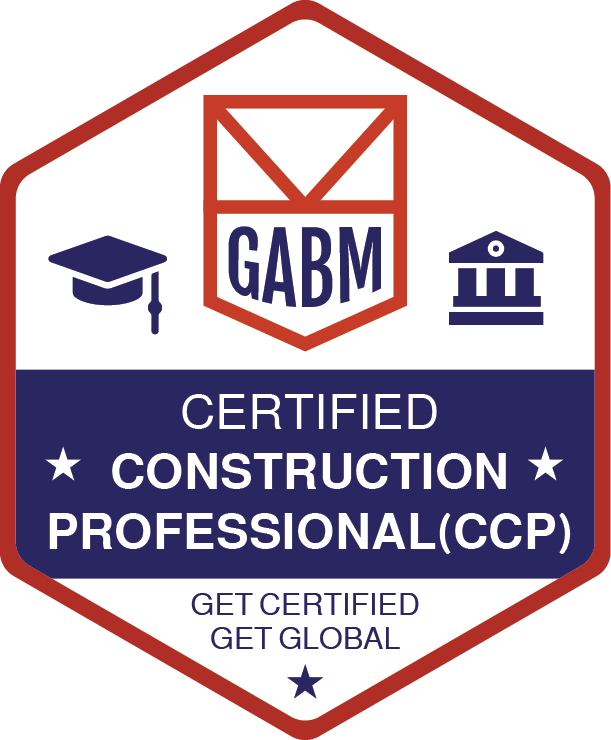
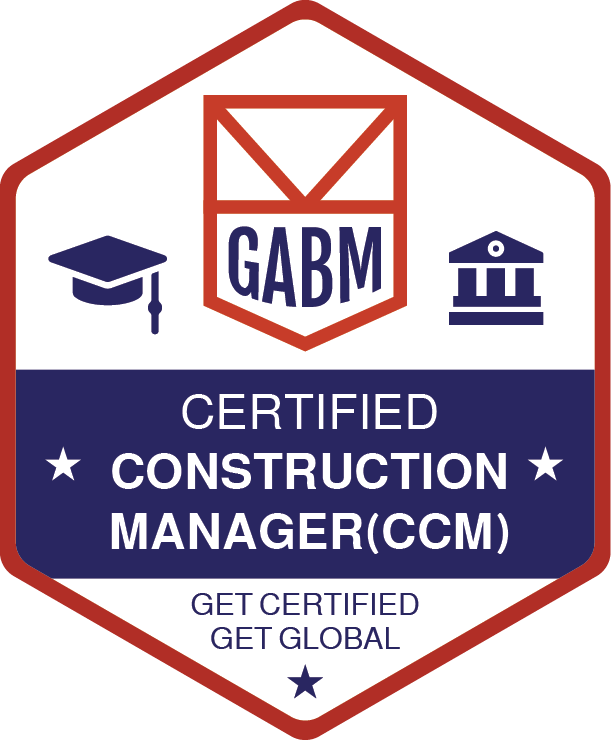
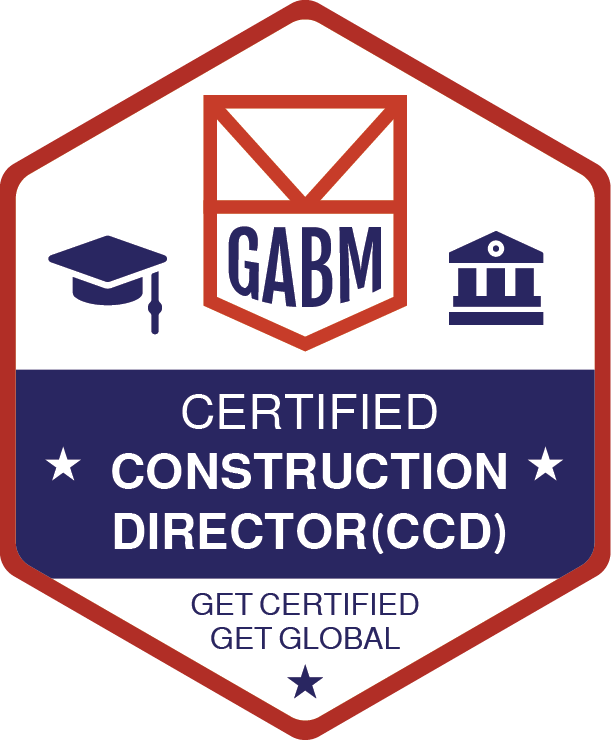
Awards are conferred in accordance with the GABM General and Academic Regulations for Students and the GABM Postgraduate Programme Assessment, Progression and Award Regulations.
Graduate Certificate in
Construction Management
Indian Rupees
Indian Nationals
14,999/-
US Dollars
International
Students
250$
Complete Learning Pack
4-6 Months Access
Graduate Diploma in
Construction Management
Indian Rupees
Indian Nationals
18,999/-
US Dollars
International
Students
300$
Complete Learning Pack
4-6 Months Access
Certified Professional in
Construction Management
Indian Rupees
Indian Nationals
18,999/-
US Dollars
International
Students
300$
Complete Learning Pack
4-6 Months Access
Certified Manager in
Construction Management
Indian Rupees
Indian Nationals
24,999/-
US Dollars
International
Students
350$
Complete Learning Pack
4-6 Months Access
Certified Director in
Construction Management
Indian Rupees
Indian Nationals
29,999/-
US Dollars
International
Students
400$
Complete Learning Pack
4-6 Months Access
Entry requirements
Entrants to this programme are normally required to have attained the following.
- Applicants should either have at least Secondary school or entry to bachelor degree for
Graduate certificate - Students who have completed bachelor degree / fresher or final year students can apply for
Graduate diploma. - Students who have completed bachelor degree / fresher or final year students can apply for
professional certificate. - Bachelor degree with 2 years’ experience for Managerial certificate.
- Bachelor degree with 2 years’ experience for Managerial certificate.
- Bachelor degree with 5 years’ experience for Director Certificate.
- A good honors degree or equivalent in a relevant subject or and work experience in relevant
management or other related field.
Career Prospect
This programme equips students with the essential subject knowledge and postgraduate skills and expertise to enable them to enter and work within the Construction and Project Management areas of practice within the construction industry. The opportunities available are fairly extensive and include the following areas of professional practice:
- Property management
- Construction management
- Project management
- Maintenance and refurbishment
- sector
- Property development
- Environmental manager
Who Should Attend
- Construction business owners and their employees ( including general contractors, speciality contractors and subcontractors )
- Public and private sector project owners and their representatives.
- Architects and Engineers
- Developers
- Construction insurers and sureties.
- Construction lenders
- Construction consultants ( accountants and attorneys )
- Individuals preparing to take professional exam.
- All whose work requires a strong grasp of construction management fundamentals.
Learning and Training Methods
The construction management programme uses a number of different assessment techniques that will allow you to demonstrate your understanding of concepts and issues covered. These may be broadly categorized as ‘coursework’ which may be in the form of individual or group assignments, practical problem-solving exercises and presentations.
It should be emphasized that the purpose of assessment is not only grade you, and provide information to facilitate management of the course, but also to provide feedback to you. In this manage it accordingly. You should keep all the returned assessment work in a file as you may have to submit this at the end of the programme for the academy to assess.
Individual model leaders will distribute information on the methods of assessment used, and their weighing at the start of each module.
Programme Curriculam MAP
|
Module / Description |
Graduate Certificate |
Graduate Diploma |
Certified Construction Professional |
Certified Construction Manager |
Certified Construction Director |
|---|---|---|---|---|---|
| Introduction to construction management | |||||
| Fundamentals of Construction management | |||||
| Construction project management framework | |||||
| Project Construction Equipment | |||||
| Risk management at construction site | |||||
| Construction contract pros and cons | |||||
| Preparing Bid Documents | |||||
| The Construction Contract | |||||
| Organizing for the construction process | |||||
| Change orders | |||||
| Disputes and Claims | |||||
| Supply Chain Management in Construction | |||||
| Progress Payment | |||||
| Pre Project Phase | |||||
| Planning and Design Phase | |||||
| Contractor selection phase | |||||
| Project Mobilization phase | |||||
| Project Operation phase | |||||
| Project Closeout and termination phase | |||||
| Assignments | |||||
| Project Report – 100 Points | |||||
| Credit Points |
200 |
300 |
400 |
480 |
480 |
Modules
- Introduction
- Project management and construction management
- Roadmap for construction management
- Project Goals and objectives
- Select project delivery system
- Construction management delivery system
- Establish terms of reference
- Qualifications of construction manager
- Construction industry segments
- General building construction
- Engineered construction
- Construction industry characteristics
- Overview of construction project life cycle
- Pre project phase
- Planning and design phase
- Contractor selection phase
- Project Mobilization phase
- Project operation phase
- Project closeout and termination phase
- Construction landmarks
- Construction scope
- Project concepts and features
- Construction project characteristics
- Construction project development :phases
and processes - Construction project management practice
- Construction project management
organization - Role and functions of construction project
manager - Main causes of project failure
- Importance of integrated planning,
scheduling and controlling of construction
projects
- Classification of major equipment
- Earth factor in earthwork
- Earth excavating equipment
- Earth cutting and hauling equipment
- Earth compacting and grading equipment
- Concreting plant and equipment
- Cranes for material handling
- Risk definition
- Project risk management strategy
development - Risk identification
- Risk assessment approach
- Risk quantitative assessment
- Risk mitigation and allocation
- Project risk response plan development and
control methodology - Multinational corporation ( MNC) operations risk
- Performance internal audit guidelines
- The human side of risk management
- Role of project manager in managing risk
- The benefits of managing risk
- The letter of intent
- Types of construction contracts
- Stipulated or lump sum contract
- Value engineering
- Cost of the work plus a fee contract
- Cost plus fee with a guaranteed maximum price contract
- Construction management contract
- Design build contract
- The general conditions to the contract for construction
- The AIA general conditions document
- The contractor qualification processes
- Safety and quality issues
- References
- The invitation to bid
- Insurance and bonds
- Owner and contractor – controlled
insurance programs - Construction surety bonds
- Sub guard
- Letter of credit
- General conditions
- Evaluation of the bid
- Contractor selection
- Introduction
- Schedule of values exhibit
- Exhibits
- Alternate exhibits
- Allowance exhibits
- Unit prices
- Guaranteed maximum price ( GMP ) contract
- Limiting an owner’s exposure to final
plan development costs - Documenting general conditions costs
- Change orders
- Controlling overhead and profits
- Including a “definitions” selection in the contract
- Liquidated damages
- Additional contract provisions
- Introduction
- Architectural forms
- The project meeting
- Shop drawings
- Material and equipment substitutions
- Value engineering
- Project schedule
- Importance of the owners role
- Requests for information
- Architects supplemental instruction and
field instructions - The submittal log
- Pace of construction
- Contracts application for payment
- Offsite material and equipment storage
- Project closeout
- Introduction
- Change order provisions in general
conditions document - Review procedures for change orders
- Documentation of change order work
- Cost issues
- Changes in scope of work
- Change order and scheduling
- Float and the schedule
- Quantum merit and unjust enrichment
- Documentation in the bidding process
- Documentation during construction
- Principle causes of disputes and claims
- Contract issues
- Plans and specification containing errors
and omissions - Lack of proper drawing coordination
- Incomplete or inaccurate responses
- Inadequate administration of the project
- Unwillingness to comply with the intent of
the drawings - Site conditions that differ materially from
the contract documents - Unforeseen subsurface conditions
- A change in conditions
- Discrepancies in the plans and / or
specifications - Disruptions to the normal pace of
construction - Inadequate financial strength of any party
- Delays and the problems they cause
- Legal precedents relating to construction claims
- Contractors guarantee of design
- Generic guidelines for coordination drawing
- Introduction to supply chain management
- The construction supply chain
- Pros and cons of subcontracting in the
construction industry - Procurement and management of subcontractors
- Purchase of materials and equipment’s
- Coordination of suppliers and subcontractors
- Lean construction
- Introduction to progress payment
- Lump sum contract
- Unit price contract
- Cost plus contract
- Incentive contract
- Percentage of construction fee contract
- Progress payment procedures
- Introduction
- Selection of project delivery system
- Traditional design – tender – build
- Design build
- Construction manager
- Project manager
- Document and construct
- Separate prime contracts
- Turnkey
- Build –own- operate -transfer
- Joint venture
- Force account
- Phased construction
- Evaluation and comparison of project
delivery system - Selection of type of contract
- Lump sum / fixed price
- Unit price / measure and value
- Cost plus
- Variations of basic cost plus
- Time and materials
- Introduction
- The parties and their roles
- Planning and feasibility study stage
- Design stage
- Contract document development stage
- Summary of planning and design
- Introduction
- Methods of contractor selection
- The contractors tender decision
- Preliminary job planning
- Cost estimating
- Proposal, preparation, submittal and opening
- Turning the estimate into a tender
- Submittal and opening process
- Selecting the successful contractor
- Criteria
- Qualifications
- Notice to proceed and contract agreement
- Introduction
- Legal and contractual issues
- Programming, planning and scheduling
- Budgeting and cost systems
- Organizing the work site
- Buying out the job
- Material procurement
- Subcontracting
- Project staffing
- Worksite organization structure
- Union labor
- One shop and merit shop nonunion contracting
- Special consideration in mobilizing for some projects
- Introduction
- Monitoring and control
- Schedule updating
- Cost control
- Data sources
- Cost reports
- Quantity section
- Cost section
- Unit cost section
- Quality management
- Safety management
- Environmental management
- Resource management
- Personnel supervision
- Labor productivity
- Materials management
- Documentation and communication
- Electronically enhanced project communications
- Introduction
- Completing the work
- Closing out the project
- Subcontractor payment
- Final release or waiver of liens
- Consent of surety
- Final quantities
- Requests for final payment
- Liquidated damages
- Final payment and release of retinage
- Final accounting and cost control completion
- Certificates
- Owner feedback
Program Structure
| Module Code | Module | Core/Elective | Credit Points |
|---|---|---|---|
| CM-601 | Introduction to construction management | Core | 20 |
| CM-602 | Fundamentals of Construction management | Core | 20 |
| CM-603 | Construction project management framework | Elective | 20 |
| CM-604 | Project Construction Equipment | Elective | 20 |
| CM-605 | Risk management at construction site | Core | 20 |
| CM-606 | Construction contract pros and cons | Elective | 20 |
| CM-607 | Preparing Bid Documents | Core | 20 |
| CM-608 | The Construction Contract | Core | 20 |
| CM-609 | Organizing for the construction process | Core | 20 |
| CM-610 | Change orders | Elective | 20 |
| CM-611 | Disputes and Claims | Elective | 20 |
| CM-612 | Supply Chain Management in Construction | Elective | 20 |
| CM-613 | Progress Payment | Elective | 20 |
| CM-614 | Pre Project Phase | Core | 20 |
| CM-615 | Planning and Design Phase | Core | 20 |
| CM-616 | Contractor selection phase | Core | 20 |
| CM-617 | Project Mobilization phase | Core | 20 |
| CM-618 | Project Operation phase | Core | 20 |
| CM-619 | Project Closeout and termination phase | Core | 20 |
| Distinctive features of the Programme | |||
|
|||
Assessment Pattern
The GABM global academy consists of variety of assessment modes.
- Written examination papers.
- Project report submission.
The exact combination of assessment varies from programme to programme and from module to module.
| Programme | Assessment pattern | Credit Points |
|---|---|---|
| Graduate certificate in Construction management |
1 Assignment | 200 |
| Graduate Diploma in Construction management |
2 Assignment | 300 |
| Certified Construction Professional (CCP) |
3 Assignment | 400 |
| Certified Construction Manager (CCM) |
3 Assignments with project report | 480 |
| Certified Construction Directtor (CCD) |
3 Assignments with project report | 480 |
Note: Assignments and patterns are subject to change without notice; candidates are required to contact office of executive education and professional certification of the academy for respective programme before start of the course.

